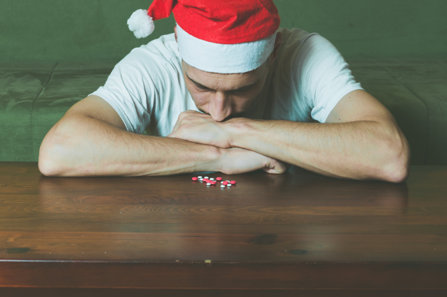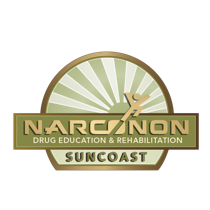Surviving the Holidays 101

The holidays can be a tough time for people around the globe, not just addicts. Although addicts have their own struggles during the holiday season, this time of year can prove to be highly stressful for pretty much anyone. Having to buy gifts at packed shopping centers, entertaining distant relatives, and traveling last-minute through busy airports are some of the “normal” stressors many feel during Christmas and Thanksgiving. It’s a whole different ballgame and series of anxiety-causing events for the active addict as well as those who have been to treatment.
While a person is in their active addiction, the holidays become a time when they need to continuously pull the wool over everyone’s eyes and convince their families that everything is okay, even when it’s obviously not. They’re having to “keep appearances,” as well as enough drugs to get through the dinners and activities without getting dope sick, but that rarely happens. Desperation sets in along with the nausea, vomiting, and shivering, so the addict starts to find a multitude of reasons to leave the house so they can go cop. Excuses range from, “I have to go to the store” to “I just want to go get a coffee at Dunkin’s.” They wind up being gone for hours, waiting for their dealer to finally show up.
For the recovered addict, the holidays can be filled with the stress of seeing family whom they haven’t seen since getting clean, the available booze, and the anxiety of having to socialize without the veil of drugs to “protect” them. Surviving the holidays during and after addiction can be sketchy, to say the least, so here’s a few tips on how to get through it.
Drinking is NEVER a Good Idea
No matter what, drinking is NOT a good idea for either an active addict or someone who’s recovered from addiction.
If a person is currently using drugs such as opioids, cocaine, methamphetamine, or marijuana, alcohol will just intensify their intoxicating effects. The end result can be catastrophic. The mixture makes a person obviously inebriated and their behavior can be unpredictable. Others seeing a family member who struggles with addiction that messed up is going to cause a major scene, heated arguments, and the whole thing will blow up.

Alcohol makes the intoxicating effects of other substances that much stronger and can lead to overdoses and, at the very least, extreme sedation. If you have a loved one who’s currently addicted, the family has a responsibility to not let them drink or get high at any family functions.
Addicts in recovery should never drink. What has to be understood is that once a person struggles with addiction, they lose the ability to take narcotics or anything with a mood or mind-altering effect without the possibility of becoming addicted again.
A huge mistake that some families make is allowing a loved one with previous substance abuse issues to drink alcohol. It doesn’t matter if alcohol wasn’t their drug of choice, it’s not smart to let them take shots, drink beer, or have a glass of wine. Many addict’s first drug was alcohol, so the gateway into addiction can also be the gateway into a relapse. Don’t let them drink, it’s not worth it. If they fight you on it, there’s a bigger problem at hand.
Properly Handle Anxiety
Anxiety is one of those things that can creep up, turn on out of nowhere, and leave an active addict or recovered addict desperate to turn it off. A person actively using drugs may fall apart at this point because their solution is to get high. If you a notice a loved one starting to look squirrely during the holidays, use it as an opportunity to confront them about their addiction and start talking to them about treatment options.
For a person who’s gone through rehab, use what you learned in treatment to handle the anxiety and everything that comes with it. Get yourself back into present time, get out of your head, take a walk, notice things in the environment, talk to a trusted family member, and make sure to get enough sleep and food.

Realize that going home for the holidays can put a person back into a stressful environment. Maybe they used to get high in the bathroom at grandma’s house or used to steal her medication. Maybe this is the first time they’ve been home since getting clean. Maybe family members drinking at dinner is making them feel uncomfortable because they don’t fully trust themselves yet.
If this is the first time they’ve been home or at a family member’s house since getting clean, having some anxiety is a normal reaction, but it can turn ugly quick if it’s not dealt with correctly.
Use Proper Communication Skills
Let’s say good communication skills are something many addicts and their families lack. If you think about it, an addict really isn’t in communication with anyone, since most of what they say is either exaggerated, embellished or a flat-out lie. So, they’re not talking to anyone, at least honestly.
Hopefully while in treatment, an addict learned a thing or two about how to properly talk to and handle the people around them. A person who’s gone through that type of treatment should hone those skills and put them to good use during the holidays. It can be hard when an antagonistic family member the addict hasn’t seen since getting clean starts in on them. It can be equally as hard when another family member hits the sauce and loses the ability to control their “inner voice.” Staying composed can be hard, but it can be done. Remember, the one who lashes out in anger or frustration becomes the “bad guy.”

An active addict should just tell someone what’s going on and finally get honest. They should find a safe person and clue them in. While the sentiment of spending Christmas and Thanksgiving with family and friends is understood, it’s not a reality for someone using drugs. That nagging voice in their heads constantly telling them they need to run out and get high can be a bit much. The active addict needs to just stop lying, swallow their pride, and reach for help. The worst that’s going to happen is spending the holidays in rehab. The best thing that could happen are sober, happy, joyous holidays in the future. There’s nothing else to lose but one’s own life.
Use the Holidays to Confront a Loved One
Things can fall apart rapidly for the active addict during holiday get-togethers. Behaviors and moods that haven’t been noticed or fully apparent before can rear their ugly heads once the addict is forced into social interactions. Feeling confined to a space (or a house) where it would be weird for them to just get up and leave, can stress them out and start causing problems.

If things start to get crazy, it’s okay. Use it as an opportunity to get the whole family involved in an intervention on the addict. Sit them down, tell them it’s obvious what’s going on, and the solution is to accept help and go to a place where they can figure out their issues.
When doing an intervention, you want the whole family involved, so if it happens during the Holidays, at least everyone is there and can work together to urge the addict towards getting help.
One ruined Thanksgiving or Christmas is nothing compared to a lifetime of sorrowful Holiday seasons after a fatal overdose. Use this as an opportunity to handle something that’s gone on for way too long.
The Holidays are supposed to be a happy time of year and nothing ruins family functions more than an active addict making things miserable for everyone else or a recovered addict who can’t keep themselves together. The above are suggestions, so use them wisely. Everyone deserves to enjoy the Holidays without the heartache of addiction.
If you need help, say something.
If you’ve already gotten help, use what you’ve learned, the family is counting on you.
